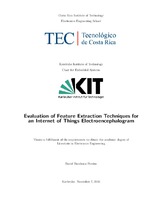Evaluation of Feature Extraction Techniques for an Internet of Things Electroencephalogram
Resumen
The emerging paradigm of Internet of Things (IoT) is revolutionizing our life with the
introduction of new services and the improvement of existing applications. IoT is covering
an ever-increasing number of applications in di erent domains including healthcare. One
speci c application in personal healthcare is the monitoring of the electrical activity in the
brain using Electroencephalogram (EEG) with portable IoT devices. Due to portability
and size constraints, most IoT devices are battery-powered which calls for energy-e cient
implementation in both hardware and software along with an e cient use of the often
limited resources.
This work evaluates three di erent feature extraction techniques for an IoT EEG in terms
of execution time, memory usage and power consumption. The techniques under study
were explored and simulated leading to select FIR, Welch's method and DWT as the
ones to be evaluated. The techniques were implemented on a MSP432P401R LaunchPad
platform, where an evaluation procedure was developed to asses the code performance.
The implementations were validated against simulated references and also optimized for
speed, code size and power consumption. The result of the performed evaluation provides
a valuable comparison between the techniques which can help any designer in choosing
the right technique based on design objectives and resource constraints.
Descripción
Proyecto de Graduación (Licenciatura en Ingeniería Electrónica) Instituto Tecnológico de Costa Rica, Escuela de Ingeniería Electrónica, 2016.


